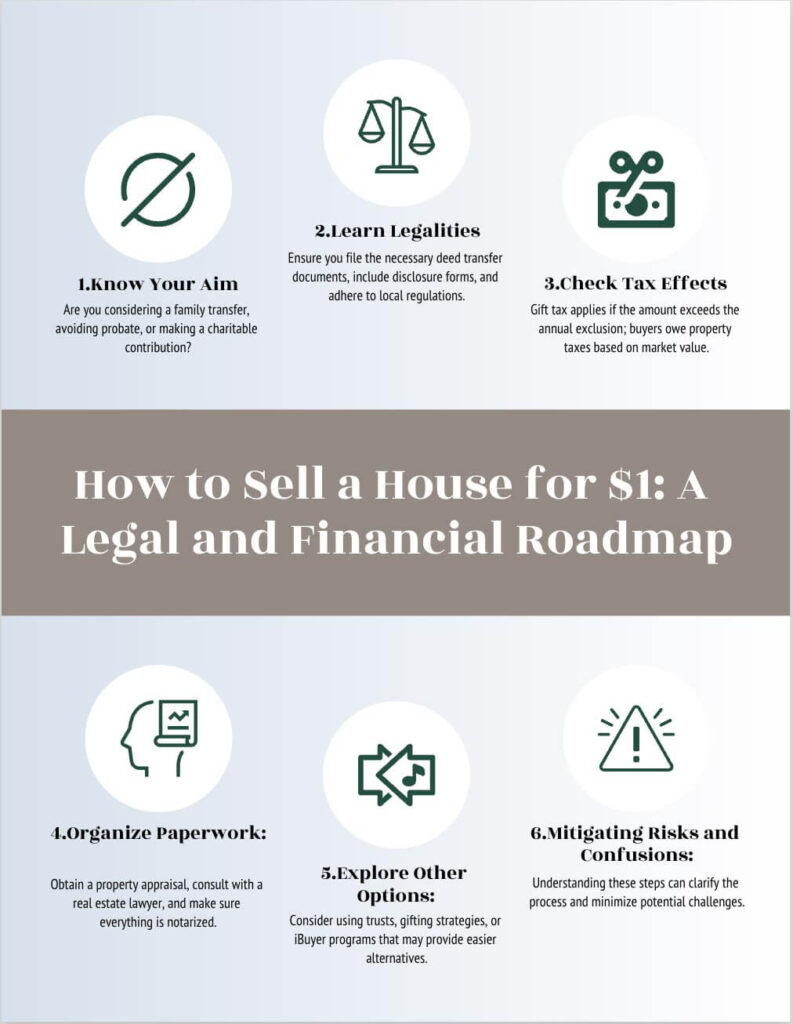Ever thought about selling a house for just $1? It’s an idea that raises eyebrows and sparks curiosity. While it might sound unusual, there are specific situations where this kind of transaction makes sense. People might consider this approach for reasons like transferring property within a family, avoiding lengthy probate processes, or even as a strategy to navigate financial challenges.
But is it really that simple—or even legal? The process involves more than just setting a rock-bottom price. There are critical legal, financial, and tax implications to understand before taking such a bold step. Failing to grasp these details can lead to unforeseen consequences, including potential audits or legal complications.
This guide dives into the key aspects of selling a house for $1. From understanding the concept to exploring alternatives, we’ll cover everything you need to make an informed decision. And if you’re looking for a hassle-free way to sell your home quickly and legally, iBuyer.com is here to help simplify the process.
Selling a House For $1
Instant Valuation, Confidential Deals with a Certified iBuyer.com Specialist.
Sell Smart, Sell Fast, Get Sold. No Obligations.
The $1 Home Sale
Selling a house for $1 might seem like a gimmick, but there are legitimate reasons people choose this approach. Let’s break down what it actually means and why someone might consider it.
What It Means
Selling a house for $1 doesn’t mean the property is worth only a dollar. It’s a symbolic price often used in unique situations, such as transferring ownership to a family member or simplifying legal processes. Despite the low sale price, the transaction still needs to meet legal requirements, including formal documentation and adherence to local property laws.
Common Reasons
1. Family Transfers. Passing property to children or relatives for nominal amounts is a common practice. This method can simplify the transfer process and may reduce complications compared to traditional inheritance.
2. Avoiding Probate. By selling or transferring property during their lifetime, homeowners can help heirs avoid lengthy and expensive probate proceedings.
3. Charitable Donations. Some property owners choose to donate homes to nonprofits or religious organizations, often setting the sale price at $1 to establish the transfer.
4. Avoiding Foreclosure. In financial hardships, homeowners may sell their property for $1 to a trusted party to maintain some control over the transaction and avoid foreclosure by lenders.
Addressing Skepticism
People often question the legitimacy of a $1 home sale. Is it a tax loophole? A trick to dodge legal responsibilities? The truth is, these sales are entirely legal as long as proper procedures are followed. However, it’s essential to understand that even a symbolic price doesn’t exempt the seller or buyer from obligations like taxes or legal fees.
Is It Legal? Key Considerations
The legality of selling a house for $1 depends on adhering to state laws and ensuring the transaction is properly documented. While the idea is unconventional, such sales are generally allowed as long as they meet certain requirements.
Laws and Regulations
Real estate transactions are governed by state-specific laws, which usually permit selling a property at any price the buyer and seller agree upon. However, authorities may scrutinize $1 sales for possible violations, like tax evasion or fraudulent intent. Ensuring that all legal steps are followed is crucial to avoid issues down the road.
Documentation Required
Even for a $1 sale, the following documents are typically required:
- Deed Transfer Paperwork: A legally binding document that transfers ownership from the seller to the buyer.
- Disclosure Agreements: A declaration of any known issues with the property, such as structural damage or zoning concerns.
- Notarization and Witnesses: Depending on the jurisdiction, notarized signatures and witnesses may be mandatory to validate the transaction.
Potential Legal Risks
Selling a house for $1 might raise red flags with taxing authorities or lenders. Here’s what to watch out for:
1. Undervaluation Risks
Tax authorities may question the sale price, especially if it’s significantly below the property’s market value. This could result in audits or re-assessments of property taxes.
2. Gift Tax Implications
Selling at a nominal price is often considered a “gift” rather than a sale, potentially triggering gift tax obligations. Sellers should consult a tax professional to understand their liability.
3. Mortgage or Lender Challenges
If the property has an outstanding mortgage, lenders might not approve the sale. Mortgage agreements often include clauses that prevent sales without full repayment of the loan.

Financial and Tax Implications
Selling a house for $1 might seem like an easy transaction, but the financial and tax consequences for both the seller and buyer can be complex. Understanding these implications is essential to avoid unexpected costs or complications.
For the Seller
1. No Monetary Gain
Selling for $1 means the seller doesn’t receive the property’s market value. While this might not matter in family transfers or donations, it’s an important consideration if financial gain was the goal.
2. Gift Tax Risks
The IRS may view a $1 home sale as a gift, with the “gift” being the difference between the market value and the sale price. Gift taxes could apply if the value exceeds the annual exclusion limit (currently $17,000 per recipient in 2023). Sellers might also need to file IRS Form 709 for the transaction.
3. Loss of Equity
The seller forfeits any accumulated equity in the home, which could have been used for retirement, investment, or other financial goals.
For the Buyer
1. Tax Liability
Even though the purchase price is $1, the buyer may still owe property taxes based on the home’s assessed market value, not the sale price. Local authorities calculate property taxes using fair market value rather than the transaction amount.
2. Capital Gains Considerations
If the buyer eventually sells the property, they may face significant capital gains taxes. This is because the IRS calculates gains using the original purchase price (in this case, $1) as the cost basis, making the taxable profit much larger.
3. Insurance Challenges
Homeowners’ insurance providers base coverage on the market value of the property. If the home is significantly undervalued in the sale, securing adequate coverage could require additional documentation and justification.
To summarize the financial and tax implications for both parties, here’s a quick comparison:
| Aspect | For the Seller | For the Buyer |
| Tax Implications | Possible gift tax if market value exceeds limits. | Property taxes based on market value, not sale price. |
| Capital Gains Tax | No significant gains; minimal tax impact. | Large taxable gain if the property is sold later. |
| Documentation Needed | Deed transfer, disclosure, and gift tax filing. | Proof of purchase for insurance and tax purposes. |
| Risks | Audits for undervaluation, losing equity. | Insurance challenges and potential tax liabilities. |
Example Scenarios
1. Family Transfer
A parent sells their $300,000 home to a child for $1. The IRS considers the difference ($299,999) a taxable gift. The seller must account for this in their lifetime gift tax exemption or pay applicable taxes.
2. Charitable Donation
A homeowner donates their house to a nonprofit and sets the sale price at $1. The donor may claim a tax deduction for the fair market value of the home, subject to IRS rules on charitable contributions.
Alternatives to Selling for $1
While selling a house for $1 might seem like a quick solution, there are often better, less complicated ways to achieve the same goals without triggering potential legal or financial pitfalls. Here are a few practical alternatives.
1. Fair Market Value Sales
Selling your home at its market value ensures transparency and avoids tax complications. If you’re transferring a property to a family member, you can still help them by gifting a portion of the proceeds or offering financial assistance in another way. This approach keeps tax liabilities clear and reduces scrutiny from authorities.
2. Utilizing Trusts or Wills
For inheritance purposes, setting up a trust or including the property in a will is often a better option than a $1 sale. Trusts can ensure the property is transferred smoothly while avoiding probate. A will, though subject to probate, provides clear instructions for property distribution.
Benefits:
- Maintains fair market value records.
- Avoids immediate tax implications or audits.
- Provides legal clarity for heirs.
3. Gifting the Property
Instead of selling for $1, you can gift the property outright. While this may still involve gift tax considerations, it eliminates the ambiguity of an undervalued sale. Make sure to consult a tax professional to determine how the value of the gift fits into your lifetime gift tax exemption.
Example: A parent gifts a $300,000 home to their child. If the amount exceeds the annual exclusion limit, it counts toward the lifetime exemption of $12.92 million (as of 2023). Proper documentation ensures compliance.
4. Selling to iBuyer Platforms
If you’re looking for a quick, hassle-free way to sell your home without undervaluing it, iBuyer platforms can be an excellent alternative. These services provide competitive offers based on the home’s market value and streamline the selling process.
Advantages of iBuyer Platforms:
- Instant offers and fast closing timelines.
- No need to undervalue your property.
- Professional guidance through the transaction.
Reilly’s Two Cents
Selling a house for $1 might sound like a creative solution, but from what I’ve seen, it’s rarely as straightforward as it seems. While it can work in specific cases—like transferring property to family or sidestepping probate—it’s critical to fully understand the implications before moving forward.
When people rush into these kinds of transactions, they often miss important details, like tax liabilities or the potential for legal complications. And trust me, the fallout can be messy—audits, disputes, or even unexpected financial penalties.
Here’s What You Need to Know
- Talk to a Real Estate Attorney
Laws vary widely depending on where you live. A good attorney will make sure you’re following the rules and have the proper paperwork in place. They’ll also help you avoid oversights that could cost you down the road. - Get a Professional Property Valuation
Even if you’re selling for $1, the property’s true value still matters. Taxing authorities look at market value—not the sale price—when calculating taxes. Having a clear valuation ensures transparency and protects both parties involved. - Plan for Taxes
A $1 sale often triggers gift tax rules. The IRS treats the difference between the market value and the sale price as a “gift,” and if it exceeds the annual exclusion, you could be on the hook for taxes. Consulting a tax professional is a must.
Selling a house for $1 might feel like a shortcut, but it’s not always the easiest or cleanest path. There are often better alternatives, like gifting the property or setting up a trust, which can achieve the same goals with fewer complications. Whatever you decide, make sure to plan ahead and get professional advice.
Conclusion
Selling a house for $1 might seem like an unusual idea, but it’s often used in very specific circumstances like family transfers, avoiding probate, or charitable donations. While the concept is simple, the execution is anything but. Legalities, tax implications, and potential risks make it essential to proceed with caution and thorough preparation.
If this approach appeals to you, make sure to seek professional advice. Consulting with a real estate attorney or tax advisor can save you from costly mistakes and ensure everything is handled legally and fairly. Whether it’s navigating gift tax laws, ensuring proper documentation, or understanding the long-term consequences, expert guidance is critical to success.
Of course, selling your home doesn’t have to be complicated. If you’re looking for a fast and stress-free solution, iBuyer.com is here to help. We specialize in streamlining property sales, providing competitive offers, and making the process as smooth as possible.
Have questions or ready to explore your options? Reach out today and let us guide you toward the best decision for your home.
Compare Cash Offers from Top Home Buyers. Delivered by Your Local iBuyer Certified Specialist.
One Expert, Multiple Offers, No Obligation.
FAQs
No, selling a house for $1 is not a way to avoid taxes. The IRS views the difference between the property’s market value and the sale price as a “gift,” which can lead to gift tax obligations. Instead of helping you sidestep taxes, this approach may attract closer scrutiny from tax authorities, potentially complicating matters further.
Not quite. While a $1 sale is often treated as a gift for tax purposes, gifting property outright can sometimes be a more straightforward approach. With a gift, there is no sale price involved, and the process focuses purely on the transfer of ownership. However, both methods require compliance with tax laws, and larger gifts may need to be reported using IRS Form 709.
If there is still a mortgage on the property, selling for $1 could pose a challenge. Lenders usually require the outstanding loan to be fully repaid before approving any ownership transfer. This means you’ll need to carefully review your mortgage agreement and communicate with your lender to determine what’s allowed.
Selling a house for $1 carries risks, including increased chances of tax audits. Tax authorities may question the sale to confirm compliance with gift tax rules. Misreporting the property’s value can also result in penalties. Additionally, insurance companies base policies on market value rather than sale price, which could lead to inadequate coverage.
To ensure everything is handled correctly, it’s important to file accurate and complete documentation for the transaction, including the deed transfer. Consulting with a real estate attorney can help you understand state-specific requirements and avoid potential issues. Full transparency with the buyer, especially in family transactions, is also key to avoiding disputes or misunderstandings down the road.
Reilly Dzurick is a seasoned real estate agent at Get Land Florida, bringing over six years of industry experience to the vibrant Vero Beach market. She is known for her deep understanding of local real estate trends and her dedication to helping clients find their dream properties. Reilly’s journey in real estate is complemented by her academic background in Public Relations, Advertising, and Applied Communication from the University of North Florida. This unique combination of skills has enabled her to seamlessly blend traditional real estate practices with cutting-edge marketing strategies, ensuring her clients’ properties gain maximum visibility and sell quickly.
Reilly’s career began with a strong foundation in social media marketing and brand communications. These skills have proven invaluable in her real estate practice, allowing her to offer innovative marketing solutions that set her apart in the industry. Her exceptional ability to understand and meet clients’ needs has earned her a reputation for providing a smooth and satisfying transaction process. Reilly’s commitment to client satisfaction and her innovative approach have garnered her a loyal client base and numerous referrals, underscoring her success and dedication in the field.
Beyond her professional achievements, Reilly is passionate about the Vero Beach community. She enjoys helping newcomers discover the charm of this beautiful area and find their perfect home.
Outside of work, she loves exploring Florida’s stunning landscapes and spending quality time with her family. Reilly Dzurick’s combination of expertise, marketing savvy, and personal touch makes her a standout real estate agent in Vero Beach, Florida.




